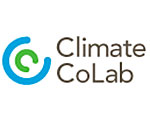Harnessing the Crowd to End Climate Change
Published May-05-14Breakthrough:
A contest-based approach to climate change galvanizes a global audience of thousands to solve intractable problems.
Company:
The MIT Climate CoLab, United States
The Story:
 When smart people from diverse backgrounds get together and pool their intellectual resources, the results can be truly phenomenal. Free from corporate or university constraints they can work independently on pure solutions.
When smart people from diverse backgrounds get together and pool their intellectual resources, the results can be truly phenomenal. Free from corporate or university constraints they can work independently on pure solutions. We is smarter than me and collective brainpower is being harnessed in a number of initiatives that are looking for solutions to environmental problems. There are many that just aren't being solved, but getting ideas is only the start of a long journey to implementing concepts that bring about change.
Crowds and Climate
The MIT Climate CoLab is a project of the MIT Center for Collective Intelligence that collaborates with organizations and individuals to create solutions for problems caused by climate change. On its crowdsourcing platform ordinary citizens can engage and work with academics and other experts to develop, analyse and promote ideas that deal effectively with climate-based issues.
To say climate change is a complex problem to solve is something of an understatement. However, intelligent and focused global teams of solvers provide some grounds for optimism.
The MIT site has attracted 10,000 registered users from dozens of countries and more than 20 open innovation contests have been posted. These have highlighted such challenge areas as how to reduce emissions from electric power generation, how to increase building energy efficiency and how the U.S. Congress can put a price on carbon emissions.
Award-Winning Solutions
The overall winner of the 2012-2013 round of open innovation contests was Dr. Geoffrey Hay and his team from the University of Calgary. Their proposal was called - 'Whose home is wasting more energy, yours or your neighbours?'
To address such issues as high energy consumption and greenhouse gas emissions of buildings they proposed HEAT – Heat Energy Assessment Technology. This is a free web service designed to help users find their HEAT Score and Hot Spots and visualize the amount and location of waste heat leaving their homes, communities and cities. It’s designed to be as easy to use as something like Google Maps and the platform also suggests fixes. For their innovation the team was awarded a $10,000 Grand Prize.
Peggy Liu and Chenyu Zheng from JUCCCE (Joint US-China Collaboration on Clean Energy), a Shanghai-based non-profit organization, received an honorable mention. They put forward a proposal called 'The China Dream'. The 40-page document looks to reshape consumerism in China and catalyze more sustainable habits.
Real Change
Today, thanks to the internet, the intelligence of millions of people can be utilized in ways that were impossible before. This can lead to smarter and more radical ideas. The scale and the speed at which solutions arrive is unprecedented and when it comes to global warming, the power of the many has the potential to bring about some very real changes.
Next Story »


